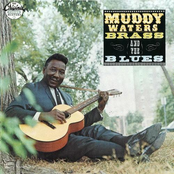Muddy, Brass and the Blues

Biography
Muddy, Brass And The Blues was Muddy Waters’ third album. It’s a bit of a stretch for Muddy. In fact, it’s not something you would expect to hear at all from Mr. Morganfield. Still, a damn fine album. This is a strange - though in large part, successful - album on a number of counts. Appearing after the release of the singles compilation "Real Folk Blues", Brass and the Blues (also sometimes known as Muddy, Brass, and the Blues) was Chess Records’ effort to give some fresh momentum to Muddy...
Muddy, Brass And The Blues was Muddy Waters’ third album. It’s a bit of a stretch for Muddy. In fact, it’s not something you would expect to hear at all from Mr. Morganfield. Still, a damn fine album. This is a strange - though in large part, successful - album on a number of counts. Appearing after the release of the singles compilation "Real Folk Blues", Brass and the Blues (also sometimes known as Muddy, Brass, and the Blues) was Chess Records’ effort to give some fresh momentum to Muddy Waters’ current recordings. It was only his third original LP following his tribute album to Big Bill Broonzy and the Folk Singer album - like them, it was a concept album, but with a difference. Those earlier albums had been built around Waters simply returning to sounds and influences out of his past, but for Brass and the Blues the label tried to give him a new sound, somewhere close to that of B.B. King (who was selling a lot of records at the time). The presence of the brass and the prominent organ on some songs was manageable. Stripped of his guitar once again (the cover photo notwithstanding), Waters proved what a great R&B singer he was — there are moments on this album where he almost crosses over into Otis Redding territory. Sammy Lawhorn and Pee Wee Madison’s guitars come through the dubbed-on brass reasonably well, and this is more of a real “band” sound than was achieved on, say, Electric Mud, an even more extreme attempt at reshaping Waters’ sound. The album was reasonably successful, though the reality in terms of Waters’s sound and history is that, when this material has been compiled, the producers have often tried to use the undubbed versions without the brass. Something different from Muddy. This was a minty surface and the mastering is fantastic. Artisan mastered by Greg Fulginiti. The sound is fantastic. Track Listing 01 – Corine, Corina – 3:37 02 – Piney Brown Blues – 3:10 03 – Black Night – 2:15 04 – Trouble In Mind – 2:51 05 – Going Back To Memphis – 2:38 06 – Betty And Dupree – 2:58 07 – Sweet Little Angel – 3:27 08 – Take My Advice – 2:48 09 – Trouble – 2:23 10 – Hard Loser – 3:05 Credits Gene Barge – Arranger, Composer, Producer, Sax (Tenor) George Barge – Producer Ralph Bass – Arranger, Liner Notes, Producer Doug Brand – Editing Don Bronstein – Design, Photography Bo Chatmon – Composer Marshall Chess – Unknown Contributor Role James Cotton – Guest Artist, Harmonica Greg Fulginiti – Mastering Pete Johnson – Composer Calvin “Fuzz” Jones – Bass Richard M. Jones – Composer Janis Joplin – Composer Sammy Lawhorn – Guitar James “Pee Wee” Madison – Guitar Ron Malo – Editing Robert McCullum – Composer Brownie McGhee – Composer Bobby Miller – Composer Robert Nighthawk – Composer Pinetop Perkins – Organ Jessie Mae Robinson – Composer Will Shade – Composer Willie “Big Eyes” Smith – Drums Otis Spann Guest Artist – Piano Charles Stepney – Arranger Cat Stevens – Composer Big Joe Turner – Composer Muddy Waters – Composer, Vocals, Guitar J. Mayo Williams – Composer Read more on Last.fm. User-contributed text is available under the Creative Commons By-SA License; additional terms may apply.


